|
|
|
Sort Order |
|
|
|
Items / Page
|
|
|
|
|
|
|
| Srl | Item |
| 1 |
ID:
130958
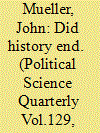

|
|
|
|
|
| Publication |
2014.
|
| Summary/Abstract |
IN A 1989 ESSAY, FRANCIS FUKUYAMA ADVANCED the notion that, with the death of communism, history had come to an end.1 This somewhat fanciful, and presumably intentionally provocative, formulation was derived from Hegel, and it has generally been misinterpreted. He did not mean that things would stop happening-obviously a preposterous proposal.2 Rather, he contended that there had been a profound ideological development. With the demise of communism, its chief remaining challenger after the extinguishment earlier in the century of monarchy and Fascism, liberalism-democracy and market capitalism-had triumphed over all other governmental and economic systems or sets of ordering principles. Looking for future challenges to this triumph, he examined the potential rise of destructive forms of nationalism and of fundamentalist religion, but found them unlikely to prevail. Thus, the triumph of liberalism was likely to be permanent.
This article evaluates developments over the subsequent quarter century and argues that Fukuyama seems to have had it fundamentally right. Beginning with the countries of Eastern Europe, democracy continued its progress after 1989. Moreover, capitalism increasingly came to be accepted, so that when the world plunged into widespread economic crisis after 2007, proposed remedies variously recommended tinkering with the system, not abandoning it.
In the meantime, violent forms of nationalism that surged in some places in the last decade of the old century scarcely proved to be much of a challenge to these trends, and the same seems likely to hold for violent forms of fundamentalist religion that surged in some places in the first decade of the new one. In fact, the significance of both of these illiberal developments seems to have been much exaggerated.
In addition, there was a striking decline of civil warfare during the decade after 1989 to low levels that have held now throughout the new century.
|
|
|
|
|
|
|
|
|
|
|
|
|
|
|
|
| 2 |
ID:
076433


|
|
|
| 3 |
ID:
071102


|
|
|
| 4 |
ID:
066662


|
|
|
| 5 |
ID:
073504
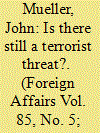

|
|
|
|
|
| Publication |
2006.
|
| Summary/Abstract |
Despite all the ominous warnings of wily terrorists and imminent attacks, there has been neither a successful strike nor a close call in the United States since 9/11. The reasonable -- but rarely heard -- explanation is that there are no terrorists within the United States, and few have the means or the inclination to strike from abroad.
|
|
|
|
|
|
|
|
|
|
|
|
|
|
|
|
| 6 |
ID:
084346
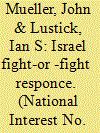

|
|
|
|
|
| Publication |
2008.
|
| Summary/Abstract |
A nuclear Iran may not be the biggest threat to Israel. Fear is a danger in and of itself. Until now, Israel has triumphed in the Middle East against overwhelming odds because of a clever, rational defense policy that used force as a last resort. If it adopts this attitude again, it can certainly withstand an atomically armed Tehran.
|
|
|
|
|
|
|
|
|
|
|
|
|
|
|
|
| 7 |
ID:
093798
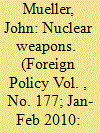

|
|
|
|
|
| Publication |
2010.
|
| Summary/Abstract |
But you might think so if you listen to world leaders right now. In his first address to the U.N. Security Council, U.S. President Barack Obama warned apocalyptically, Just one nuclear weapon exploded in a city-be it New York or Moscow, Tokyo or Beijing, London or Paris-could kill hundreds of thousands of people.And it would badly desabilize our security, our economies, and our very way of life.Obama has put nuclear disarmament back on the table in a way it hasn't been for decades by vowing to pursue a nuclear-free world, and, with a handful of big treaty negotiations in the works, he seems to think 2010 has become a critical year.
|
|
|
|
|
|
|
|
|
|
|
|
|
|
|
|
| 8 |
ID:
162357


|
|
|
| 9 |
ID:
174624


|
|
|
|
|
| Summary/Abstract |
On May 15, 1984, the countries in Europe had largely managed to remain at peace with each other for the longest continuous stretch of time since the days of the Roman Empire. 1 That rather amazing record has been further extended—by now, the continent may well be experiencing the longest period (75 years) free from substantial interstate war since Europe itself was invented as a concept some 2,500 years ago.
|
|
|
|
|
|
|
|
|
|
|
|
|
|
|
|
| 10 |
ID:
061904


|
|
|
| 11 |
ID:
066733


|
|
|
| 12 |
ID:
178908


|
|
|
|
|
| Summary/Abstract |
The likelihood that anyone outside a war zone will be killed by an Islamist extremist terrorist is extremely small. In the United States, for example, some six people have perished each year since 9/11 at the hands of such terrorists—vastly smaller than the number of people who die in bathtub drownings. Some argue, however, that the incidence of terrorist destruction is low because counterterrorism measures are so effective. They also contend that terrorism may well become more frequent and destructive in the future as terrorists plot and plan and learn from experience, and that terrorism, unlike bathtubs, provides no benefit and exacts costs far beyond those in the event itself by damagingly sowing fear and anxiety and by requiring policy makers to adopt countermeasures that are costly and excessive. This article finds these arguments to be wanting. In the process, it concludes that terrorism is rare outside war zones because, to a substantial degree, terrorists don’t exist there. In general, as with rare diseases that kill few, it makes more policy sense to expend limited funds on hazards that inflict far more damage. It also discusses the issue of risk communication for this hazard.
|
|
|
|
|
|
|
|
|
|
|
|
|
|
|
|
| 13 |
ID:
113675


|
|
|
|
|
| Publication |
2012.
|
| Summary/Abstract |
The reaction of Americans to the terrorist attacks of September 11, 2001, has been massively disproportionate to the actual threat posed by al-Qaida either as an international menace or as an inspiration or model for homegrown amateurs. An examination of the activities of international and domestic terrorist "adversaries" reveals that exaggerations and distortions of the threat have inspired a determined and expensive quest to ferret out, and even to create, the nearly nonexistent. The result has been an ill-conceived and remarkably unreflective effort to react to an event that, however tragic and dramatic in the first instance, should have been seen to be of only limited significance at least after a few years. Not only has the terrorism delusion had significant costs, but the initial alarmed perspective has been so internalized that anxieties about terrorism have persisted for more than a decade despite exceedingly limited evidence that much fear is justified.
|
|
|
|
|
|
|
|
|
|
|
|
|
|
|
|
| 14 |
ID:
108737


|
|
|
|
|
| Publication |
Oxon, Routledge, 2011.
|
| Description |
xii, 227p.
|
| Standard Number |
9780415781763
|
|
|
|
|
|
|
|
|
|
|
|
Copies: C:1/I:0,R:0,Q:0
Circulation
| Accession# | Call# | Current Location | Status | Policy | Location |
| 056389 | 355.02/MUE 056389 | Main | On Shelf | General | |
|
|
|
|
| 15 |
ID:
089340
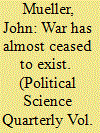

|
|
|
|
|
| Publication |
2009.
|
| Summary/Abstract |
John Mueller suggests that we may be reaching a point at which war, as conventionally defined, ceases or nearly ceases to exist in both its international and civil varieties. He assesses the phenomenon and speculates about what this development, should it definitively materialize, might suggest about the various explanations and theories scholars and analysts have preferred to explain the problem of war.
|
|
|
|
|
|
|
|
|
|
|
|
|
|
|
|
| 16 |
ID:
089421


|
|
|
|
|
| Publication |
2009.
|
| Summary/Abstract |
John Mueller suggests that we may be reaching a point at which war, as conventionally defined, ceases or nearly ceases to exist in both its international and civil varieties. He assesses the phenomenon and speculates about what this development, should it definitively materialize, might suggest about the various explanations and theories scholars and analysts have preferred to explain the problem of war.
|
|
|
|
|
|
|
|
|
|
|
|
|
|
|
|
|
|
|
|
|